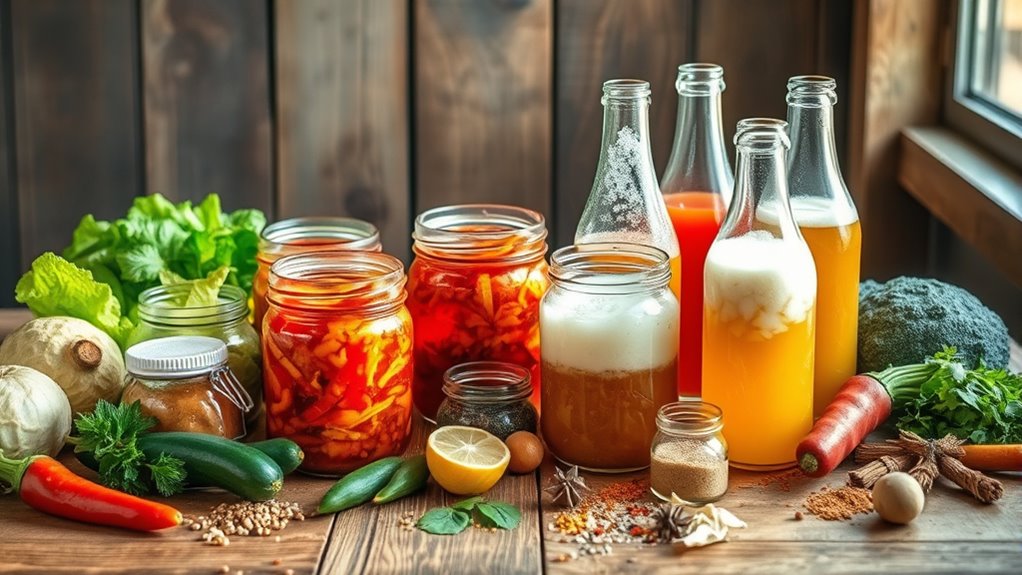Fermented foods like kimchi and kombucha pack a punch of flavor and health benefits. These tasty staples are rich in probiotics, which support your gut health and enhance digestion. They’re also loaded with vitamins and minerals that boost your overall well-being. You can easily add these foods to your meals—kimchi in tacos or kombucha as a fizzy drink. With so many options available, you’re just scratching the surface of what fermented foods have to offer.
Key Takeaways
- Fermented foods like kimchi and kombucha are rich in probiotics, enhancing gut health and digestion.
- Kimchi is a nutrient-dense Korean dish made from seasoned vegetables, providing vitamins and unique flavors.
- Kombucha is a fizzy tea brewed with a SCOBY culture, offering digestive benefits and a refreshing alternative to sugary beverages.
- Yogurt, kefir, miso, and tempeh are other popular fermented foods, each contributing diverse flavors and health advantages.
- Incorporating a variety of fermented foods into your diet can promote overall health and culinary creativity.

Have you ever wondered why fermented foods are gaining so much attention? You’re not alone. The buzz around foods like kimchi, kombucha, and yogurt has surged in recent years, and for good reason. These foods aren’t just trendy; they offer a plethora of health benefits that can enhance your well-being. As you explore this culinary world, you might find yourself intrigued by the science behind fermentation and its impact on your body.
Fermentation is a natural process that transforms sugars into acids, gases, or alcohol using microorganisms like bacteria and yeast. You might’ve encountered this process without even realizing it—think about the tangy flavor of sauerkraut or the fizz of your favorite kombucha. These foods are rich in probiotics, which are beneficial bacteria that can support gut health. By consuming these foods regularly, you can promote a balanced gut microbiome, potentially improving digestion and boosting your immune system.
Kimchi, a staple in Korean cuisine, is one of the most celebrated fermented foods. Made from seasoned vegetables, usually napa cabbage and radishes, kimchi is packed with vitamins, minerals, and probiotics. If you haven’t tried it yet, it’s worth adding to your meals. Whether you enjoy it as a side dish or incorporate it into recipes like fried rice or tacos, you’ll find that it adds a zesty kick while providing health benefits.
Kombucha, on the other hand, is a fermented tea that’s become a popular beverage choice. Brewed with black or green tea and sugar, it’s fermented using a symbiotic culture of bacteria and yeast (SCOBY). The result is a fizzy drink that not only quenches your thirst but also offers potential digestive benefits. If you’re looking to switch up your drink routine, a glass of kombucha might just be the invigorating option you need.
But it’s not just about these two! There are countless other fermented foods to discover. From yogurt and kefir to miso and tempeh, each offers unique flavors and health advantages. By diversifying your diet with these foods, you can introduce a range of nutrients and probiotics that support overall health.
Frequently Asked Questions
What Are the Health Benefits of Fermented Foods?
Fermented foods offer numerous health benefits. They enhance digestion by providing probiotics, which support gut health. You might notice improved immune function, as these foods can boost your body’s defenses. They’re often rich in vitamins and minerals, too, contributing to overall wellness. Additionally, consuming fermented foods can help with weight management and may even improve mental health by influencing your gut-brain connection. So, incorporating them into your diet can really benefit you!
How Do I Start Making My Own Fermented Foods?
To start making your own fermented foods, pick a simple recipe, like sauerkraut. Chop cabbage, mix it with salt, and pack it tightly into a jar. Let it sit at room temperature for a week, checking daily for bubbles. You’ll notice the tangy aroma as it ferments. After a week, taste it; if it’s sour enough, it’s ready! Remember, experimenting with flavors can make the process even more enjoyable and personal.
Can Fermented Foods Be Harmful in Any Way?
Yes, fermented foods can be harmful if not prepared or stored properly. You might encounter issues like contamination, which can lead to foodborne illnesses. Additionally, some individuals may experience digestive discomfort or allergic reactions due to certain ingredients. It’s essential to follow safe fermentation practices and verify your ingredients are fresh. If you’re unsure about a batch, it’s best to err on the side of caution and discard it.
How Should Fermented Foods Be Stored for Freshness?
To keep those tangy treasures fresh, store them in airtight containers, like a cozy hug for your food. Keep ’em in the fridge, where the cool air slows down fermentation, preserving their vibrant flavors. Always use clean utensils when scooping, so you don’t invite unwanted guests. If you spot any odd colors or smells, it’s time to say goodbye. Treat your fermented goodies right, and they’ll reward you with deliciousness!
Are There Any Dietary Restrictions for Consuming Fermented Foods?
Yes, there are some dietary restrictions for consuming fermented foods. If you’re lactose intolerant, you might want to abstain from dairy-based ferments like yogurt or kefir, as they can cause discomfort. People with histamine intolerance should also be cautious, since many fermented foods contain high levels of histamine. Additionally, if you have certain allergies or sensitivities, always check labels and ingredients to guarantee safety. It’s best to consult a healthcare professional if you’re unsure.
Conclusion
Incorporating fermented foods like kimchi and kombucha into your diet can be a delightful coincidence that boosts your health. Just think: you might be sipping on a tangy drink while your gut reaps the benefits, or enjoying a spicy side dish that elevates your meal and nourishes your microbiome. It’s amazing how these vibrant foods can transform your wellness journey. So why not explore the world of fermentation? You might just discover your new favorite flavor along the way!









